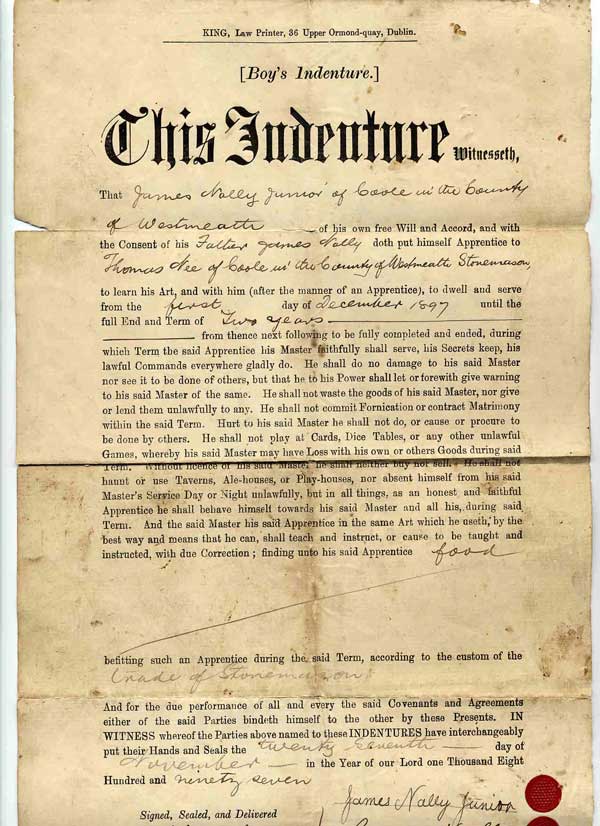In any discussion of slavery, it would be a good idea to include the institution of indentured service. An indenture is essentially a limited term of slavery which is entered into voluntarily and benefits both parties. This was basically the practice of signing a contract that bound a person to a servant/master relationship for a specified period of time in exchange for something of value. In the case of my grandfather, it was in exchange for teaching him the trade of stone-mason.
Indentured service is, of course, not the same as slavery – not by a long shot. It has a very clear end date; at least it was supposed to. The main reason that indentured service was outlawed is that unscrupulous masters would contrive reasons to extend the term of indenture by claiming that the servant had unpaid debts that had to be repaid before the terms of the indenture were satisfied.
In many respects, a properly executed contract of indenture is essentially the same as a young man signing up with the military. He is provided with food, housing, medical care, clothing, and other benefits. He is taught a skill that may (or may not) be a valuable skill when his contract ends. In return, he is subject to their rules, must obey all lawful orders without question, and cannot simply walk away from his term of service.
Take a few moments to read over this agreement. Indentured servant agreements are no longer legal, and while they may be viewed as barbaric, I suspect that our society is worse off for that. It was signed between two willing participants in which both benefited. My grandfather would never have been able to afford to go to school to learn a skilled trade like that, so becoming an indentured servant gave him that opportunity.


I agree. I think indentured servitude is a great concept in theory, and I wish there were a way for it to still exist. Unfortunately, a few greedy souls can ruin a good thing and force the governments hand to put an end to it. If this service existed today, it would be over-regulated in a way that solely profited the government, to where neither master nor servant would benefit.
PS: Was indentured service ended through each state’s constitution one at a time or federally through the amending process? Or was it simply banned across all states without any type of ratification?
I don’t know, but I suspect that it was a federal decision – most likely based on a court ruling rather than a specific legislation aimed at indentured servanthood.
Pingback: Linkpost 02-12-11 | Amerika: New Right, Conservationist, Traditionalist, Deep Ecology and Conservative Thought
The tradition of indentured service was brought to America by the defeated Royalists/Cavaliers in the aftermath of the English Civil War. The tradition survived in varying degrees in the South and West Country of England, from which most Royalists/Cavaliers, originated until the second World War.
The practice was peculiar to the displaced Cavaliers of the Tidewater and American South. Its practice was abhored by the Puritans of New England and the Quakers of Pennsylvannia and the Mid-Atlantic colonies.
Its practice, unfortunately some would say, was a precursor to the introduction of slavery to the colonies and while it is true slavery was permitted or existed in some form at one time or another in all 13 colonies it was only in the South, due to its hierarchial culture imported by the Cavaliers from the South of England that slavery was fully accepted and implemented.
Very interesting! My own Conn ancestors, three brothers from Mayo County, Ireland, eagerly sought and grabbed the opportunity to come to America as indentured servants. According to family stories handed down, indentured servitude literally saved their lives. Fleeing Ireland, they arrived in Philadelphia and one Conn brother remained there. A second brother eventually made his way to Colorado, and my own 3x great grandfather, John Thomas Conn, lived for a while in Virginia and later settled in Big Shanty (now Kennesaw) Georgia. Life was good for John Thomas in Georgia until Abraham Lincoln ordered the invasion of the Confederate States. General Sherman ransacked and burned down Big Shanty, and Yankee soldier’s killed three of his four sons, including my 2x great grandfather, William Elisha Conn. None of the Conns ever own a slave.
If I am not mistaken, wasn’t the first slave owner in the colonies a freed black man or indentured servant that gained his freedom? I seem to remember the generalities of it but specifics escape me. It was in Virginia if I remember correctly.
Yes, we’ve got a post about that very topic. His name was Anthony Johnson.
http://www.confederatecolonel.com/2010/05/the-anthony-johnson-story/